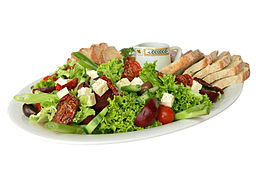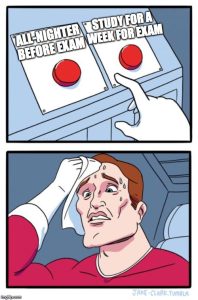Preparing for the Long Haul
Greg Hartley

College is a marathon, but you can walk it.
Here’s a little-known fact about college success: stamina matters more than intelligence. College success depends on creating patterns that help build stamina. Taking care of yourself, practicing good habits, and careful time management make or break new college students. Take these next suggestions very seriously. They could change your life.
Practicing Self-care
Everyone has twenty-four hours to spend each day. Prioritize sleep, work, and play in roughly equal measures. Sleep plays the biggest role here. Most college students live in a state of constant sleep deprivation.[1] Long hours and frequent overnighters take weeks to make up.
Going to college in Alaska puts students at even higher risk. The school year begins just as daylight hours start to shrink, increasing the risk for Seasonal Affective Disorder and further disrupting sleep and mental health.[2]
The best way to combat those winter blues? Movement! This is where the playtime comes in. All too often, college students spend their free time in front of a screen, making work and play essentially the same activity physically. This takes a severe toll on both mental and physical health. There’s no need to join a gym or ski up a mountain, but the same study cited above mentions that some time outdoors every day combats SAD better than any other remedy. Yes, it’s cold, so bundle up! If you’ve spent some time moving, you will also sleep better, taking care of two trouble spots at the same time.

Walking makes for an easy way to get more movement into your day. Walk from one class to the next instead of moving your car. Take an indoor route if you prefer warmth over the cold. Walk your pet or walk with a friend who has a pet. Go to the mall and walk the hallways. Take the stairs instead of the elevator. Numerous studies have proven how walking benefits mental and emotional health.[3] Plus it requires no equipment, no training, and almost always costs nothing to begin.

The last major ingredient in selfcare is eating well. It’s a well-established fact that most Americans do not practice healthy habits.[4] But eating better does not have to be difficult. Fast food and heavily processed foods have been shown repeatedly to be linked to diabetes, depression, and many other poor health outcomes. So good health comes down to choice. Favor simple foods and keep levels of sugar and fat under control. Make a habit of eating your largest meal in the morning instead of late in the evening, and try eating at least one meatless meal per day. Don’t love a plate of leafy greens? That’s okay. Taking a daily multivitamin can help make up for missing nutrition. Choose one with lots of vitamin D if you struggle to stay positive during the long, dark winter months.
The Tools of Success
We can be brief for the last section of this chapter. Sometimes lists serve better than paragraphs, and it’s just fine to switch between the two (as long as you have a good reason for doing it).
Success in a college writing course requires you to assemble a toolbox of necessary gear that will help you succeed. Let’s look at that list now:

Google’s G-Suite – this includes not only Google Docs, but Google Slides, Google Sheets, Gmail, Google Drive, and Google Calendar. We will be using all of these, so make sure you know how to get to each tool and why they matter.
Google Drive – Drive deserves special mention because it’s the only G-Suite program that has to be downloaded. You get free cloud storage as a UAA student, and it lets you backup files automatically. Don’t be the next student who has to start a paper over the night before it’s due because your computer crashed and you forgot to make a backup.
Microsoft Office – also called Microsoft 365, you can download this entire suite for free with your University of Alaska log-in. You can choose either Word or Google Docs to write your essays. Pick whichever one works best for you.
Blackboard – You probably used Blackboard to get access to this textbook, but that’s not the only Blackboard feature we will use. All of our essays will be turned in digitally through Blackboard, so make sure you know how to download, save, and upload a file. This trips new students up every semester who are used to only using iPhones and Chromebooks. And speaking of Chromebooks . . .
Reliable Laptop – We have found that Chromebooks do not work well with any aspect of the college student experience. If you have one, you can get through this class with it, but put a new laptop on your birthday or Christmas list. Some students try to complete this class using nothing but a Smartphone. This almost always causes unnecessary stress. I don’t recommend trying it. You can get a free laptop to use all semester by visiting the UAA Library.
Distraction Filters – This isn’t software. In fact, it’s the knowledge of when to stop using software, but it’s still an important tool. The more distracted you are, the less time you’ll have to work, leading to procrastination, stress, lower GPA, and possibly dropping out altogether. Only you know what kinds of distractions you deal with, but some common ones are social media, video games, music, noisy family members, and demanding workplaces. Admittedly, you have more control over some of these things than others, but you definitely can put the phone in Do Not Disturb mode and set the PlayStation controller down for a while. If you find yourself easily or constantly distracted, it’s time to ask why that’s happening. The University can even help you ask the right questions, but be willing to hear the answers. One major strategy to fight distraction is committing now to . . .

Complete a little work every day – One of the key differences between college and high school is that high school homework can often be completed in one setting, whereas college homework can take days or weeks to finish. Lots of students are not prepared for that change, so they delay their college work until the day before it’s due, thinking they can get it done quickly with little thought, just like they did in high school. Then they realize how huge the assignment really is and they get overwhelmed, staying up all night only to produce low-quality work (if they finish at all). This happens so often that it’s a meme. The better option? Just do a little bit of work each day. Nibble at your big projects instead of swallowing them whole. Give 20 minutes to each class every night, and I promise, those overwhelming assignments will become manageable.
And lastly, how well do you know yourself?
- How long do you need to read?
- How long do you need to write?
- How will work and school mix?
- Are your self-discipline skills up for this?
- Lund, Hannah G., et al. "Sleep patterns and predictors of disturbed sleep in a large population of college students." Journal of Adolescent Health 46.2 (2010): 124-132. ↵
- Drew, Elaine M., Bridget L. Hanson, and Kevin Huo. "Seasonal affective disorder and engagement in physical activities among adults in Alaska." International Journal of Circumpolar Health 80.1 (2021): 1906058. ↵
- Kelly, Paul, Marie Murphy, and Nanette Mutrie. "The health benefits of walking." Walking. Vol. 9. Emerald Publishing Limited, 2017. 61-79.; Johansson, Marcus, Terry Hartig, and Henk Staats. "Psychological benefits of walking: Moderation by company and outdoor environment." Applied Psychology: Health and Well‐Being 3.3 (2011): 261-280. ↵
- Phillips, Jennan A. "Dietary Guidelines for Americans, 2020–2025." Workplace Health & Safety 69.8 (2021): 395-395. ↵
One's ability to remain productive over an extended period time.

